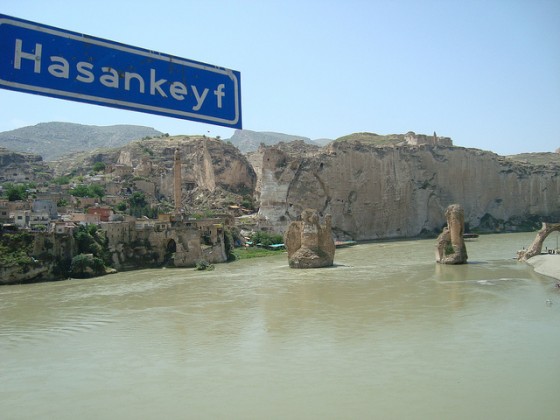 A planned dam in southeastern Turkey would submerge Hasankeyf’s 10,000-year-old cultural relics and displace 50,000 people from the region. How many kilowatt hours is that worth?
A planned dam in southeastern Turkey would submerge Hasankeyf’s 10,000-year-old cultural relics and displace 50,000 people from the region. How many kilowatt hours is that worth?
Electric energy demand in Turkey is projected to more than double over the next decade, to approximately 450 billlion kilowatt-hours. Traditional sources of power, such as coal- and natural gas-fired plants, pollute the local and global environment and have forced Turkey to rely on neighbors like Iran and Russia. A new report by a consortium of hydroelectric producers, described in Turkey’s Today’s Zaman, points out that, so far, Turkey only uses one third of its potential hydropower. If fully utilized, it could supply more than 30 percent of the 450 billion kwH needed in 2020.
So why does hydropower still have a less than sterling reputation amongst environmentalists? For several good reasons, it turns out.
Although hydropower is renewable, and its generation does not directly release fossil fuels into the atmosphere, building a hydraulic dam involves tearing up land and clear-cutting forests all around the site. In Turkey, where some of humankind’s earliest settlements were built in the fertile land beside rivers, millennia of history can also end up submerged by rising water levels from a single hydro project. Interrupting a river’s flow with a dam adversely affects riparian ecosystems at the dam site as well as habitat hundreds of kilometers downstream from it.
In the past, for example, the Turkish government tried to build a dam in the country’s only biosphere zone, despite the fact that the project would have required uprooting 600 trees in a forest that is home to the only populationof a certain type of honeybee. That project was canceled because of intense opposition by local and country-wide environmental groups.
But other projects, such as a dam on the Euphrates that partially submerged the 2,000-year-old Roman trading town of Zeugma, have fundamentally altered habitats and caused the displacement of thousands of people.
Hasankeyf is the latest Turkish town to fight a hydroelectric project that would, quite literally, drown it. The Ilisu Dam would raise water levels in Hasnakeyf by 200 feet, forcing many of its residents to move and inundating a valley with a remarkably rich and ancient history. According to a Smithsonian profile of the town, it passed through the hands of Roman, Byzantine, Turkish, Arab, and Mongol dynasties, each of whom left some cultural or architectural marks on the area. Marco Polo may have passed through while the town was enjoying a commercial boom thanks to its position on the Silk Road.
But nowadays, rising energy demand and the allure of domestically produced electricity are high enough to endanger Hasankeyf and other sites like it. If the same institutional support could be marshaled for solar or wind, equal progress toward energy independence and cleaner power production could be made.
Judging by the feed-in tariffs the government announced for solar and wind at the end of last year, however, that move is a long way off yet. In the meantime, environmentalists, archeologists, and local residents of dam sites will continue to make noise about the dark side of hydropower in Turkey.
Read more about hydropower and renewable energy in Turkey:
Turkey Plans To Dam Its Sole Biosphere
Turkey Joins 78 Others To Pass Feed-In Tariffs To Encourage Renewable Energy
“Dam” Victory For Turkey’s Environmentalists!
Image via mutsuzluksuzluk



